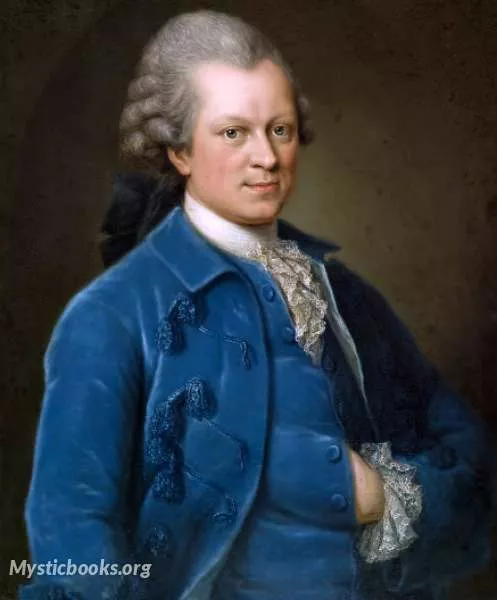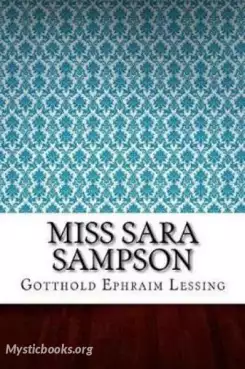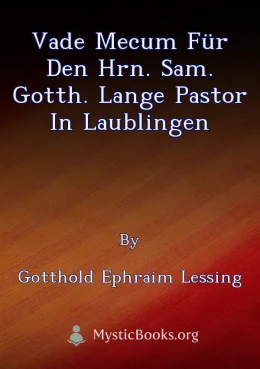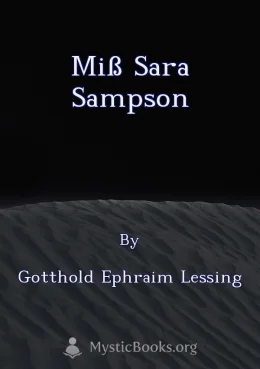
Timeline
Title
Country/Nationality
Gotthold Ephraim Lessing
Gotthold Ephraim Lessing was a German writer, philosopher, dramatist, publicist and art critic, and an outstanding representative of the Enlightenment era. His plays and theoretical writings substantially influenced the development of German literature. He is widely considered by theatre historians to be the first dramaturg in his role at Abel Seyler's Hamburg National Theatre.
Lessing was born in Kamenz, a small town in Saxony, to Johann Gottfried Lessing and Justine Salome Feller. His father was a Lutheran minister and wrote on theology. Young Lessing studied at the Latin School in Kamenz from 1737 to 1741. With a father who wanted his son to follow in his footsteps, Lessing next attended the Fürstenschule St. Afra in Meissen. After completing his education at St. Afra's, he enrolled at the University of Leipzig where he pursued a degree in theology, medicine, philosophy, and philology (1746–1748).
It was here that his relationship with Karoline Neuber, a famous German actress, began. He translated several French plays for her, and his interest in theatre grew. During this time, he wrote his first play, The Young Scholar. Neuber eventually produced the play in 1748.
From 1748 to 1760, Lessing lived in Leipzig and Berlin. He began to work as a reviewer and editor for the Vossische Zeitung and other periodicals. Lessing formed a close connection with his cousin, Christlob Mylius, and decided to follow him to Berlin. In 1750, Lessing and Mylius teamed together to begin a periodical publication named Beiträge zur Historie und Aufnahme des Theaters. The publication ran only four issues, but it caught the public's eye and revealed Lessing to be a serious critic and theorist of drama.
In 1752, he took his master's degree in Wittenberg. From 1760 to 1765, he worked in Breslau (now Wrocław) as secretary to General Tauentzien during the Seven Years' War between Britain and France, which had effects in Europe. It was during this time that he wrote his famous Laocoön, or the Limitations of Poetry de.
In 1765, Lessing returned to Berlin, leaving in 1767 to work for three years at the Hamburg National Theatre. Actor-manager Konrad Ackermann began construction of Germany's first permanent national theatre in Hamburg, established by Johann Friedrich Löwen de. The owners of the new Hamburg National Theatre hired Lessing as the theatre's critic of plays and acting, an activity later known as dramaturgy (based on his own words), making Lessing the very first dramaturge. The theatre's main backer was Abel Seyler, a former currency speculator who since became known as "the leading patron of German theatre." There he met Eva König, his future wife. His work in Hamburg formed the basis of his pioneering work on drama, titled Hamburgische Dramaturgie. Unfortunately, because of financial losses due to pirated editions of the Hamburgische Dramaturgie, the Hamburg Theatre closed just three years later.
In 1770, Lessing became librarian at the ducal library, now the Herzog August Library (Herzog-August-Bibliothek, Bibliotheca Augusta), in Wolfenbüttel under the commission of the Duke of Brunswick. His tenure there was energetic, if interrupted by many journeys. In 1775, for example, he accompanied Prince Leopold to Italy.
On 14 October 1771, Lessing was initiated into Freemasonry in the lodge "Zu den drei Goldenen Rosen" in Hamburg.
In 1776, he married Eva König, who was then a widow, in Jork (near Hamburg). She died in 1778 after giving birth to a short-lived son. On 15 February 1781, Lessing, aged 52, died during a visit to the wine dealer Angott in Brunswick.
Lessing was also famous for his friendship with Jewish-German philosopher Moses Mendelssohn. A recent biography of Mendelssohn's grandson, Felix, describes their friendship as one of the most "illuminating metaphors [for] the clarion call of the Enlightenment for religious tolerance". It was this relationship that sparked his interest in popular religious debates of the time. He began publishing heated pamphlets on his beliefs which were eventually banned. It was this banishment that inspired him to return to theatre to portray his views and to write Nathan the Wise.
Books by Gotthold Ephraim Lessing

Miss Sara Sampson
Miss Sara Sampson is a play by the Enlightenment philosopher, Gotthold Ephraim Lessing. Written in 1755 while the author was living in Potsdam, it is seen by many scholars to be one of the first bourgeois tragedies. In the same year it was represente...

Vade mecum für den Hrn. Sam. Gotth. Lange Pastor in Laublingen
Gotthold Ephraim Lessing's "Vade mecum für den Hrn. Sam. Gotth. Lange Pastor in Laublingen" is a scathing critique of Pastor Lange's translation of Horace's Odes. Lessing, a renowned poet and critic, mercilessly exposes the flaws in Lange's work, dem...

Miß Sara Sampson
Miss Sara Sampson is a pioneering work in German literature, considered the first bourgeois tragedy. It tells the story of Sara Sampson, a young woman from a respectable family who falls in love with the charming but irresponsible Mellefont. Their pa...